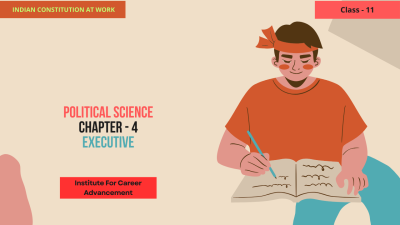Executive - Class 11

₹299
Executive is a Class 11 chapter that likely explores the functions, powers, and responsibilities of the executive branch of government. It might delve into topics such as: The Executive Branch: The role and importance of the executive branch in a democratic system. The President and Vice President: The powers and responsibilities of the president and vice president, including their roles in the legislative and judicial processes. The Prime Minister: The role and powers of the prime minister as the head of government and leader of the cabinet. The Cabinet: The composition and functions of the cabinet, including the allocation of portfolios and decision-making processes. Bureaucracy: The role of the bureaucracy in implementing government policies and providing public services. Checks and Balances: The mechanisms in place to check the power of the executive branch, including the legislature and the judiciary. Overall, this chapter likely provides a comprehensive overview of the executive branch of government, its functions, and its relationship with other branches of government. নির্বাহী হল একাদশ শ্রেণীর একটি অধ্যায় যা সম্ভবত সরকারের নির্বাহী শাখার কাজ, ক্ষমতা এবং দায়িত্বগুলি অন্বেষণ করে। এটি নিম্নলিখিত বিষয়গুলি নিয়ে আলোচনা করতে পারেঃ নির্বাহী শাখাঃ গণতান্ত্রিক ব্যবস্থায় নির্বাহী শাখার ভূমিকা ও গুরুত্ব। রাষ্ট্রপতি ও সহ-রাষ্ট্রপতিঃ রাষ্ট্রপতি ও সহ-রাষ্ট্রপতির ক্ষমতা ও দায়িত্ব, আইন প্রণয়ন ও বিচার প্রক্রিয়ায় তাদের ভূমিকা সহ। প্রধানমন্ত্রীঃ সরকারের প্রধান এবং মন্ত্রিসভার নেতা হিসাবে প্রধানমন্ত্রীর ভূমিকা ও ক্ষমতা। মন্ত্রিসভাঃ পোর্টফোলিও বরাদ্দ এবং সিদ্ধান্ত গ্রহণের প্রক্রিয়া সহ মন্ত্রিসভার গঠন ও কার্যাবলী। আমলাতন্ত্রঃ সরকারি নীতি বাস্তবায়নে এবং জনসেবা প্রদানে আমলাতন্ত্রের ভূমিকা। চেক এবং ব্যালেন্সঃ আইনসভা এবং বিচার বিভাগ সহ কার্যনির্বাহী শাখার ক্ষমতা পরীক্ষা করার জন্য ব্যবস্থা। সামগ্রিকভাবে, এই অধ্যায়টি সম্ভবত সরকারের নির্বাহী শাখা, এর কার্যকারিতা এবং সরকারের অন্যান্য শাখার সাথে এর সম্পর্কের একটি বিস্তৃত বিবরণ প্রদান করে।
Learn more
 0
0 